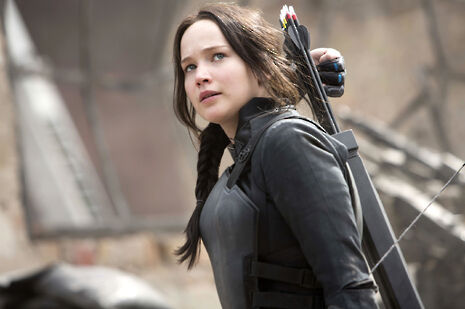Film: The Hunger Games: Mockingjay – Part 2

Thankfully, Mockingjay Part 2 steers away from the clichés which have suffocated the preceding films, such as the salutes of solidarity and the now annoyingly identifiable Mockingjay whistle. This mainly helped the film’s second and third acts, which were on the whole compelling and entertaining. The camera work is immersive, and the shaky lenses and intimacy of angles really draws audiences into the action. The action sequences are gripping and at times jumpy (especially the sewers sequence): the film does well in manipulating and executing suspense. Seeing the city’s traps in action bolsters the films adrenaline, and they retain the raw and sadistic dimension which made the first film of the series so enticing.
Yet the story has its faults. The beginning of the film takes a long time to find a dramatic sense of pace, and conversely, the action in the film’s climax doesn’t last long enough. The Katniss-Peeta-Gale love triangle is overdone and indecisive, and its presence in the film feels more out of a necessity to adhere to the books than it does for successful storytelling. One of the deaths is also incredibly rushed and does little to evoke an emotional response, while the other deaths feel formulaic and predictable.
Jennifer Lawrence, with her portrayal of Katniss Everdeen, has successfully brought to life one of the most successful cinematic heroines. Defiant, driven and, most importantly, vulnerable, Lawrence’s leading presence in the film doesn’t disappoint. Josh Hutcherson’s performance as Peeta Mellark was pleasing, if one overlooks the wobbly display of acting at the beginning; Hutcherson thrives playing the endearing loving Peeta and isn’t always convincing as the Capitol’s hijacked alternative. On the other hand, Liam Hemsworth’s portrayal of Gale was as flat and one dimensional as ever. The rest of the ensemble we know and love from the series, such as Elizabeth Banks as Effie Trinkett, and Woody Harrelson as Haymitch Abernathy. They delighted with their quirky, original and spirited interpretations of the characters, but were disappointingly not given enough screen time.
Yet Jennifer Lawrence’s maturity and experience over the past few years has grown exponentially; her three Academy Award nominations over the past five years (one of which she won) are testament to that. Such development makes her place in The Hunger Games feel slightly outgrown. For example, Lawrence’s ending display of emotion shows an utterly defeated Katniss, a character that has suffered the unimaginable at the greatest cost. Yet her commendable display of acting is not matched by the coming together of the other aspects of the end the film – scenes are hurriedly cut together and the sense of story takes a dive, making it difficult to feel the overwhelming weight of the odyssey of the preceding films culminate successfully. The final scene with Katniss and Peeta grown-up and with children feels cringeworthy, drawn out, and is unsatisfactory compensation for the horrors the characters have endured. Katniss’ reflection that the games "get a little tedious" is all too fitting for the franchise’s ending.
The failure of the ending points to a wider mistake: that of splitting Mockingjay into two films. The fact that the film drags at a slow pace for so long completely rebukes the case to be made that the story needed to be drawn out; just one film would have contained enough drama and emotion to creating a convincing trilogy, but as a quadrilogy, the overall tale loses its momentum.
Above all this, however, is the film’s concern to convey something more than mere entertainment. The use of surveillance, avid desire for TV coverage, political corruption and manipulation of the media, though frame-worked in the world of Panem, feels scarily close to home. Though a piece of fiction, the film feels no less ‘real’ in the values, characters, and social observations it offers, striking relatable chords with the audience.
 News / Fitz students face ‘massive invasion of privacy’ over messy rooms23 April 2024
News / Fitz students face ‘massive invasion of privacy’ over messy rooms23 April 2024 News / Cambridge University disables comments following Passover post backlash 24 April 2024
News / Cambridge University disables comments following Passover post backlash 24 April 2024 Comment / Gown vs town? Local investment plans must remember Cambridge is not just a university24 April 2024
Comment / Gown vs town? Local investment plans must remember Cambridge is not just a university24 April 2024 Comment / Does Lucy Cavendish need a billionaire bailout?22 April 2024
Comment / Does Lucy Cavendish need a billionaire bailout?22 April 2024 Interviews / Gender Agenda on building feminist solidarity in Cambridge24 April 2024
Interviews / Gender Agenda on building feminist solidarity in Cambridge24 April 2024





